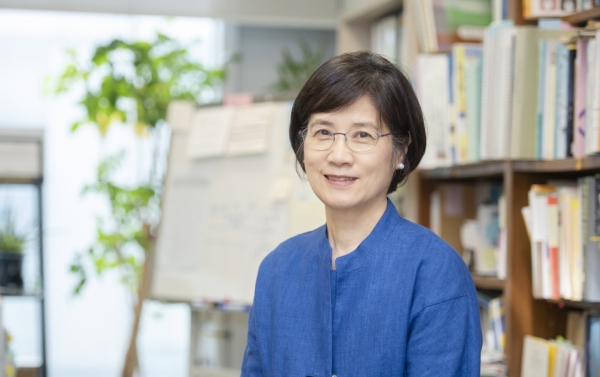
Ewha is on the way to improve itself into a place for both people with and without disabilities. In April, Ewha was selected as the best university in the 2021 Evaluation of Educational Welfare Support for Disabled Students from the Ministry of Education. There is a person who contributed the most for Ewha’s success in developing a better environment for people with disabilities.
Professor Park Seung-hee, the professor from the Department of Special Education, is the most significant contributor of all programs in Ewha which supports people with disabilities and enhance the awareness in disabilities. Professor Park graduated with a minor in Special Education. Later, she received her Master’s and Doctor’s degrees in Special Education at Syracuse University, which is pre-eminent in the inclusive education, intellectual and developmental disabilities and disability studies.
After returning to Ewha, Park became a pioneer, being the first to implement many programs amongst Korean universities. In 2013, the “Disability & Society” courses developed by Professor Park was offered as the first college liberal arts class in Korea to be initiated under the banner of disability studies. Professor Park aimed to enhance the students’ understanding of disability in terms of multidisciplinary approaches and problems related to ableism.
“Students can broaden and deepen understanding of themselves through studying about disability: realizing one’s strengths and accepting weaknesses,” Professor Park said.
“I believe students have learned that disability is not a master status of someone, but one of the diverse background features through my course.”
Most notably, Professor Park leads the supported employment of people with developmental disabilities in Ewha campus since 2009 with five employees. Currently, there are 12 employees with developmental disabilities who work in seven different job sites like the Central Library, ECC fitness center, and the Career Development Center.
“All settings where employees with developmental disabilities are working were developed by me,” Professor Park said. “It required the consent and cooperation of immediate superiors and professors in charge of each workplace to accept the employees with disabilities, which is not always possible.”
Ewha Academy for COmmunity Living of Adults with Developmental Disabilities(E-ACOLA), the first post-secondary and lifelong education program based on college campus in Korea, is another program that has been carried out by Professor Park since the fall semester of 2001 at the Ewha Global Future Lifelong Education Institute. E-ACOLA supports young adults with developmental disabilities to acquire practical and social skills for a successful adult life such as financial management, social manners, common vocational skills, functional communication, and self-advocacy skills.
The classes were taught by the main instructors and peer buddy system, working as a team of one undergraduate volunteer and two young adult students with developmental disabilities. Most undergraduate volunteers were Ewha students trying to build friendships with the participants of E-ACOLA as a peer tutor and earn credits for community service. According to Kim Yoo-jin, a doctoral student and an instructor who teaches at E-ACOLA, the peer buddy system has given young adults with developmental disabilities a chance to learn social interaction skills and peer group cultures.
Kim states participants of E-ACOLA consider it as the only place to make friends and feel the pleasure of learning. However, due to COVID-19, the program temporarily stopped from the spring semester of 2020.
“There are lots of students with developmental disabilities waiting for the academy to reopen,” Kim said. “Regarding ‘Living with COVID’ scheme and the applicants’ wishes; it might be resumed in the spring semester of 2022. Professor Park and I are preparing for the spring semester of 2022 of E-ACOLA.”
For Ewha’s undergraduates with disabilities, Professor Park played a leading role in both the establishment and operation of the Support Center for Students with Disabilities (SCSD). Around the time SCSD established, Professor Park was the Associate Dean of Office of University Planning and Coordination and contributed to the opening of SCSD.
According to Professor Park, SCSD focuses on constructing individualized supports for each student and considering the sensitivity of students’ needs in learning, social or mobility areas when it provides supports. Ewha students could participate in the peer assistant program of SCSD supporting peer students with disabilities or special needs in campus.
“I hope that all members of Ewha are motivated to make ‘a community caring each other’ through SCSD,” Professor Park stated. “It’s important to cultivate the community spirit of caring. Not only students with disabilities, but everyone face times when we need support from one another.”
Professor Park advised Ewha students to always look around as there is always a neighbor in need.
“If you are a student who lives your life diligently and sincerely, you would accept the fact that there are people with disabilities or extra support needs in your neighborhood without questions,” Professor Park said. “I am certain that Ewha students are willing to build solidarity with them and make a world where all of us live together. We are connected!”

